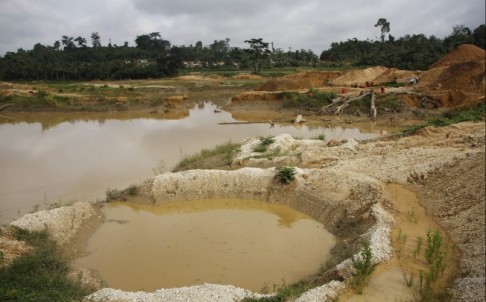Monday, 01 July, 2013
He Huifeng
huifeng.he@scmp.com
A small-scale mining site once mined by Chinese miners in Dunkwa-on-Offin in the center of Ghana. Photo: AFP
When Su Zhenyu arrived in Ghana in 1995 to live his African dream, there were barely 100 Chinese people in the small, resource-rich country.
In the 18 years since, the 42-year-old Guangxi native has made a living in many different ways, including translator, casino manager, salesman and even as powerbroker between Beijing and Ghana's gold miners.
Su has witnessed the growth of Ghana's Chinese population from less than 100 to tens of thousands in recent years as immigrants poured into the country in search of gold.
And now he is witnessing the explosion of tension and violence between the Chinese immigrants - most of whom are involved in illegal gold mining - and the locals.
The Ghanaian government launched a campaign last year to fight illegal mining.
The Chinese miners are blamed for environmental degradation and depriving Ghanaians of millions of dollars in lost revenue. The increase in tension saw many Chinese robbed and attacked by locals, resulting in a big exodus in the past few weeks.
Su is now looking for new career opportunities in the country.
"When I came to Ghana for the first time I thought African countries were poor and backward but friendly to Chinese people." Su said, "Until now, most Chinese people thought the same."
When he first arrived most of the Chinese in Ghana were from Hong Kong and Taiwan. "There was no real Sino-Ghana relationship," Su said.
Things started to change from 1998 as mainland China's development raced ahead and Beijing increased aid to Africa, he said.
In the decade that followed, Ghanaians regarded Chinese with respect because most of the mainlanders in the country at that time worked for big state-owned enterprises, aiding various infrastructure projects.
Inspired by the developing Sino-African friendship, a growing number of Chinese companies, especially private ones, became interested in investing in Africa. As early as 1997, some Chinese businessmen arrived in Ghana looking to try their luck in gold mining.
At that time, the mining skills of Ghanaians were still very primitive and inefficient, explained Su. For example, the locals first tried to blast a pit in the ground, he said. "Men would dig rocks and sand from the pit by hand and crush them. Women would use a pan to wash and sluice sediment for gold.
"Some bosses from Hunan province came to Ghana in 1997 with made-in-China diesel oil hammer machines. I worked for them as a translator. The machines were much better than manpower but still not enough.
"The gold price was stagnant, only about 50 yuan per gram in 1998, or US$300 per ounce. The Hunan men made no money and quit Ghana."
When Su went back to Guangxi for a holiday at the end of 2005, he heard that people in Shanglin, a county close to his hometown, were highly skilled miners and made high-powered sand-pumping machines designed to dredge for alluvial gold.
A few months later, Su returned to Ghana with three Shanglin gold miners. They had raised 800,000 yuan (HK$1 million), which they used to rent and work a strip mine that had been dug and abandoned by locals.
"I still remember the date, August 15, 2006, the first day we started to mine," he said. "The land produced about 30 grams of gold on the first day, 20 grams the next day and 40 grams the third day. We all felt depressed and my partners even planned to leave.
"But a miracle happened on the afternoon of the fifth day when we were arguing with each other. That afternoon, the land produced 1,400 grams of gold," Su said.
News of their success made it back to Shanglin, attracting a steady stream of fortune hunters to follow in their footsteps.
When the Shanglin villagers arrived in Ghana, international corporations already controlled the larger sites suitable for hard-rock gold mining, so they focused on setting up small mines, many on farmland near rivers.
More than 50,000 Chinese gold miners - two-thirds of them from villages in Shanglin - have poured into Ghana since 2005.
"If each of the 2,000 gold mines operated by the Chinese produces 50 grams of gold a day and works 20 days a month, that would be 24 million grams a year," Su said.
But their luck has come to an end with the rise of ill feeling between the local and immigrant communities.
This article appeared in the South China Morning Post print edition as Gold rush over for Chinese in Ghana


1 comment:
Ha ! Just like that Chinese "cement" factory that set up on the banks of rewa river . FFS !
Post a Comment